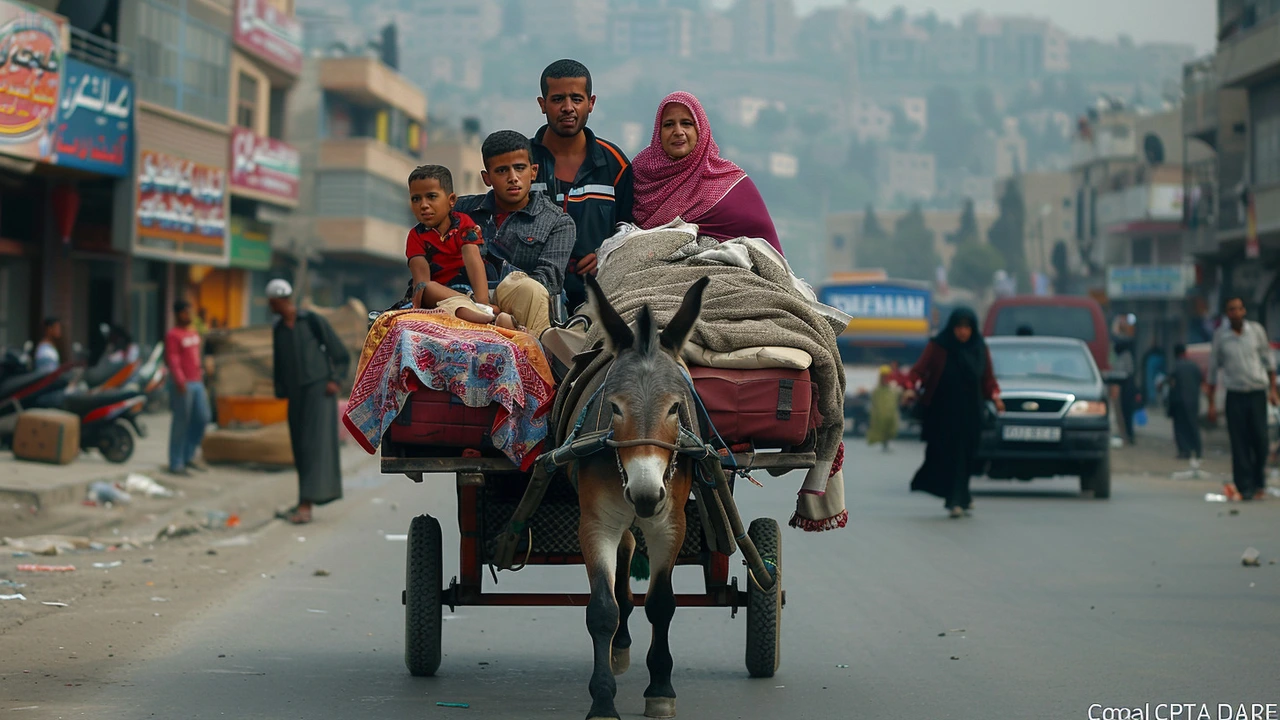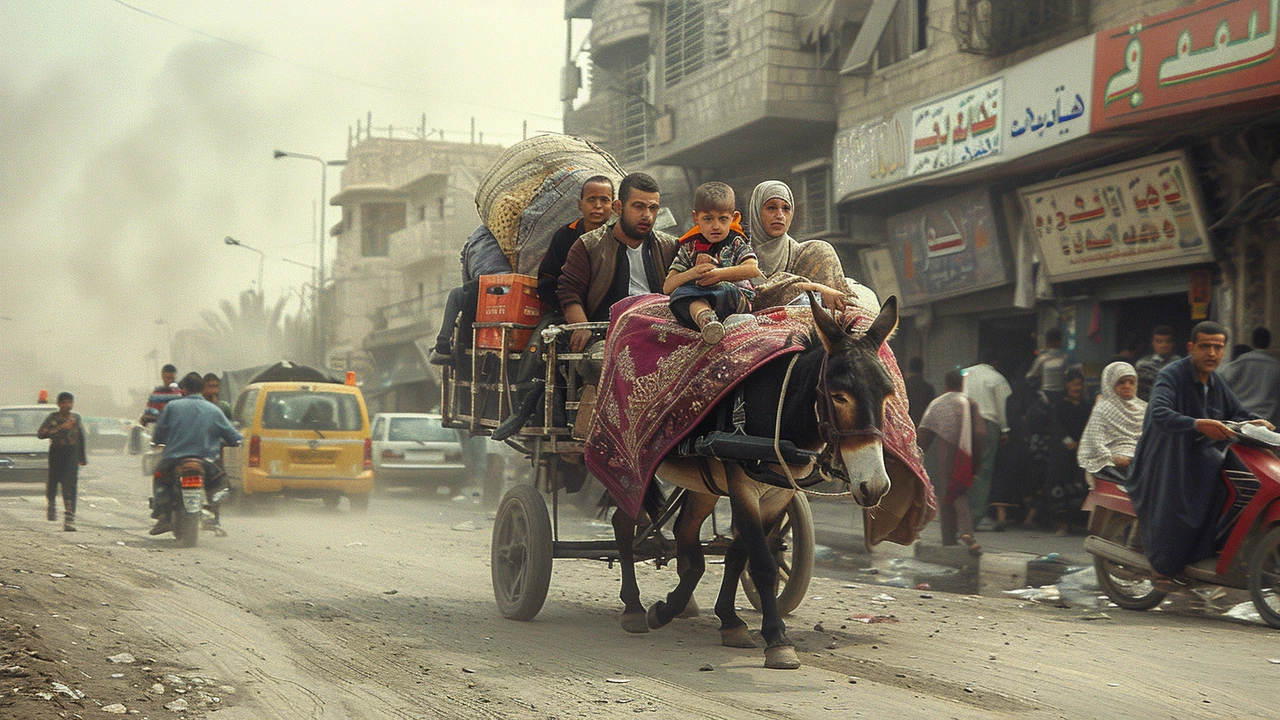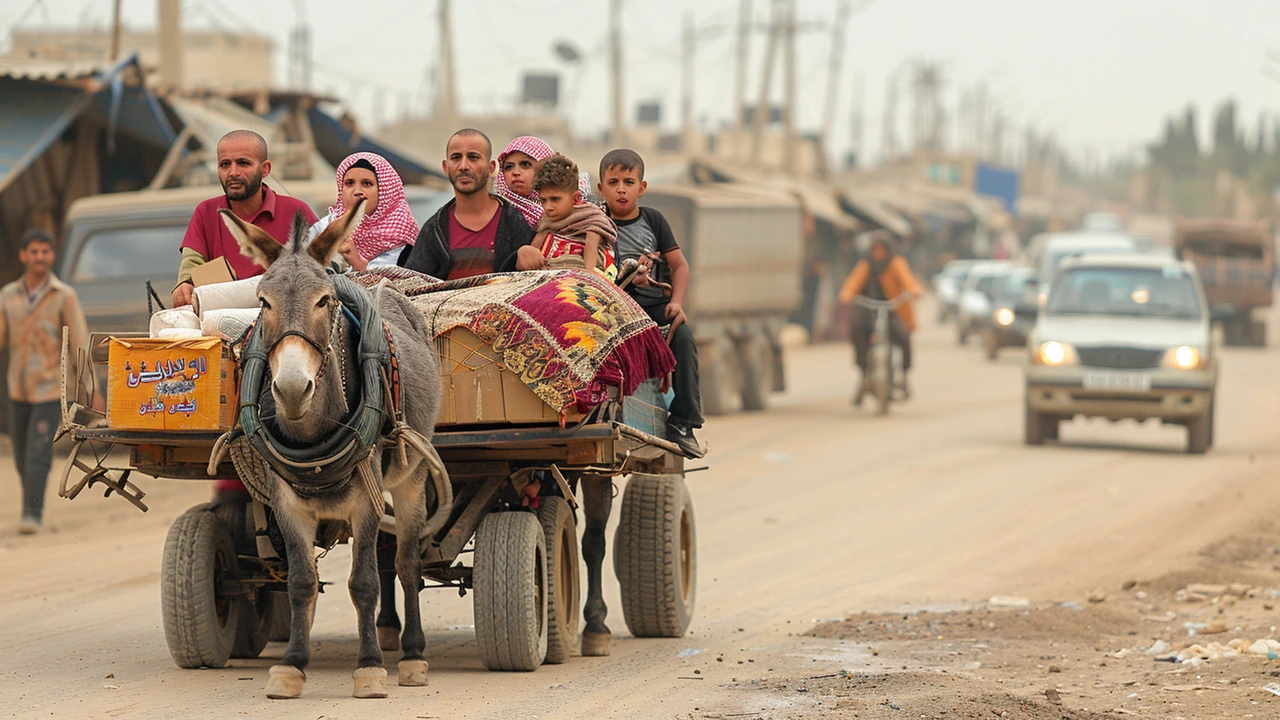In the aftermath of a deadly military strike in Rafah that resulted in the deaths of 45 Palestinians, President Joe Biden has called on Israel to take every possible measure to protect civilians. The aerial attack, which took place on Sunday night, ignited the makeshift shelters of those residing in a Rafah camp, turning what little they had into ashes. This plea from the US President comes amid mounting pressure from within his own Democratic party to reevaluate America's support for Israel.
The Rafah strike has sparked considerable outcry, particularly from prominent Democratic lawmakers who have been vociferous in their criticism. Alexandria Ocasio-Cortez described the incident as 'an indefensible atrocity' and demanded a halt to US military aid to Israel. Her colleague, Ayanna Pressley, similarly expressed her shock and outrage, emphasizing the human toll of these military actions. Meanwhile, Rashida Tlaib, a Michigan lawmaker of Palestinian descent, went so far as to call Israeli Prime Minister Benjamin Netanyahu a 'genocidal maniac,' further illustrating the deep divisions within the party.
Speaking from his office, Netanyahu defended the strike, asserting that it was not aimed at civilians and had unfortunately gone 'tragically wrong'. He emphasized the difficult nature of combat situations where errors can lead to unintended casualties. Despite his assurances, the incident has only added fuel to the growing calls for a more restrained American stance on the Israel-Hamas conflict.
President Biden, navigating through these turbulent waters, has indicated that the US government is actively engaging with Israeli military officials to gain clarity on the circumstances surrounding the strike. The administration is seeking to balance its long-standing alliance with Israel with the increasing discontent among Democratic voters and lawmakers over the handling of the situation.
According to recent polls, nearly half of Democratic voters disapprove of Biden's approach to the Israel-Hamas conflict, highlighting the complex and often conflicting nature of US foreign policy in the Middle East. As civilian casualties rise, so do the voices calling for justice and accountability, forcing the administration to walk a tightrope between supporting a key ally and addressing the humanitarian concerns raised by its own citizens.
The growing divide within the Democratic party reflects a broader shift in attitudes toward the Israeli-Palestinian conflict. Many younger and progressive members of the party increasingly advocate for a more balanced approach that considers the rights and welfare of Palestinians. This has led to calls for significant changes in US foreign aid policies, particularly military assistance that is perceived to contribute to the ongoing violence.
Given the sensitive nature of the situation, the Biden administration is reportedly working around the clock to navigate these challenges while maintaining a coherent and principled foreign policy. However, as the conflict continues to unfold, the pressure from both domestic and international fronts is likely to intensify, demanding a more nuanced and proactive stance from the White House.
In the days to come, the Biden administration will need to demonstrate its commitment to human rights and civilian protection while strategically balancing its geopolitical interests. This will involve not only diplomatic engagement with Israeli and Palestinian leaders but also addressing the concerns of a progressively vocal and influential segment of the Democratic party.
Such complexities underscore the intricate web of alliances and oppositions that define US involvement in the region. With each passing day, the stakes grow higher, and the demand for a sustainable and humane solution becomes all the more pressing. The world watches closely as President Biden works to uphold a legacy of diplomacy and peace in the face of mounting challenges.
As these discussions continue to evolve, one thing remains clear: the human cost of the conflict must be at the forefront of any resolution. Ensuring the protection of innocent lives and addressing the root causes of the strife are essential steps toward a lasting peace. In doing so, the Biden administration must navigate the delicate balance between strategic alliances and the moral imperatives that guide international relations.
Biden's Delicate Balancing Act
The conflict between Israel and Hamas has long been a contentious issue in both American and global politics. President Biden’s call for Israel to safeguard civilians following the Rafah strike comes as part of a broader strategy to address the escalating humanitarian crisis without compromising strategic alliances. This balancing act involves multiple facets, each with its own set of challenges and complexities.
The Biden administration faces the daunting task of managing its diplomatic relationship with Israel while responding to the growing calls for restraint from within the Democratic party. High-profile figures such as Alexandria Ocasio-Cortez have been particularly vocal in their demands for accountability. Ocasio-Cortez's condemnation of the Rafah strike highlights the urgency with which she and like-minded lawmakers are pushing for a reevaluation of US military aid to Israel.
The Role of US Military Aid
Military aid to Israel has been a cornerstone of US foreign policy for decades. However, the recent escalation in violence and the resulting civilian casualties have led to growing scrutiny of this policy. Calls to suspend or reduce military aid come from a belief that it may inadvertently contribute to the ongoing conflict and the humanitarian toll it is taking on Palestinian civilians.
Lawmakers like Ayanna Pressley and Rashida Tlaib are advocating for a more ethical approach. Pressley’s statements on the harm inflicted upon Palestinian civilians resonate with a broader movement within the Democratic party that prioritizes human rights and equitable treatment in international affairs. Tlaib’s branding of Netanyahu as a 'genocidal maniac' further cements the urgency felt by many to reassess American support for Israel's military actions.

Netanyahu's Defense and the Tragic Mistake
In stark contrast to the US lawmakers’ criticisms, Israeli Prime Minister Benjamin Netanyahu has maintained that the strike in Rafah was not meant to target civilians. Describing it as a tragic mistake, Netanyahu has emphasized the challenges inherent in military operations where the fog of war can lead to unintended consequences.
Netanyahu’s defense points to the highly volatile and unpredictable nature of warfare. Despite these assertions, the civilian death toll and the vivid images of destruction have left an indelible mark on the international community. Questions of accountability and the necessity of stringent measures to prevent such tragedies in the future are now at the forefront of diplomatic discussions.
The Israeli government's position underscores the complexity of achieving operational objectives while minimizing collateral damage. This aspect is particularly challenging in densely populated areas like Rafah, where distinguishing between combatants and non-combatants can be exceedingly difficult.
The Path Forward: Diplomacy and Engagement
As President Biden and his administration work to address the multifaceted dimensions of this conflict, diplomatic engagement remains a key strategy. Engaging with Israeli and Palestinian leaders to foster dialogue and understanding will be crucial in moving toward a peaceful resolution. Additionally, the involvement of international bodies and allies can help in mediating and brokering agreements that prioritize humanitarian considerations.
Moving forward, it is imperative that the Biden administration articulates a clear and coherent policy that aligns with both domestic and international expectations. This involves not only immediate responses to crises like the Rafah strike but also long-term strategies to address the root causes of the conflict. Building trust and facilitating constructive dialogue can help pave the way for a more stable and peaceful future in the region.

Humanitarian Considerations
Amid the geopolitical maneuvering, the human impact of the conflict cannot be overstated. The devastation in Rafah serves as a poignant reminder of the lives lost and the suffering endured by countless civilians. Humanitarian aid, reconstruction efforts, and support for displaced communities are essential components of any comprehensive response.
The international community must prioritize efforts to provide immediate relief to those affected by the violence. This includes medical assistance, food, shelter, and psychological support for traumatized individuals. Ensuring the protection and welfare of civilians must be at the heart of any diplomatic initiatives, recognizing the intrinsic value of every human life irrespective of national or political affiliations.
In conclusion, the recent Rafah strike has brought to light the urgent need for a nuanced and compassionate approach to the Israeli-Palestinian conflict. President Biden’s call for Israel to protect civilians reflects a critical step towards addressing the humanitarian crisis, even as it highlights the deep-seated complexities of US foreign policy. The road ahead is fraught with challenges, but through diplomacy, engagement, and a steadfast commitment to human rights, there is hope for a more just and peaceful resolution.

Michelle Warren
May 29, 2024 AT 00:40Man this whole Rafah mess feels like a tragic circus where nobody wins. The president’s plea is just a polite nudge while the real pain stays hidden behind political games. I can’t help but think the media is sugar‑coating the bloodshed with fancy words. Folks keep talking about “strategic alliances” but forget there are real families burning their tents. It’s a mess and we all need to wake up.
Christopher Boles
May 29, 2024 AT 01:46We gotta keep pushing for peace.
Crystal Novotny
May 29, 2024 AT 04:33The Rafah strike forces us to confront the moral calculus of modern warfare. It raises the question of whether any nation can claim a clean conscience when civilians are caught in the crossfire. History shows that wars rarely discriminate between combatants and innocents. The United States has long stood behind Israel with billions in aid. That support becomes morally dubious when bombs fall on shelters. One must ask if the strategic benefits outweigh the human cost. The democratic backlash reflects a deeper shift in public values. Younger voters are tired of hollow justifications. They demand accountability from their leaders. Political parties cannot ignore this rising tide of dissent. Leaders who ignore civilian suffering risk eroding their legitimacy. It is not enough to offer vague assurances of “mistakes”. Concrete steps are needed to prevent future tragedies. Transparency in military operations should become a non‑negotiable standard. Ultimately the pursuit of security must not sacrifice the very people it claims to protect.
Reagan Traphagen
May 29, 2024 AT 07:20Wake up people the media and the so‑called elites are feeding you lies about this war. Every time they claim a “tragic mistake” it’s just a cover for a planned genocide. The deep state wants us to keep sending money to Israel so they can keep control over the Middle East. They hide the real agenda behind humanitarian chatter while civilians burn. Don’t be fooled by the President’s empty promises. The whole operation is a puppet show staged by global financiers.
mark sweeney
May 29, 2024 AT 08:20Yo the conspiracy vibe is tasty but we need actual proof before we label every policy a puppet show. Yeah the system’s flawed but dropping bombs on civilians isn’t a grand scheme it’s a horrible mistake. Let’s focus on real solutions not just screaming about deep‑state strings.
randy mcgrath
May 29, 2024 AT 09:20I hear your points and they echo a deeper philosophical dilemma about the price of security. It reminds me of the classic debate whether the ends truly justify the means. While we crave safety we must also safeguard our humanity. Balancing these values is the true challenge we face as a global community.